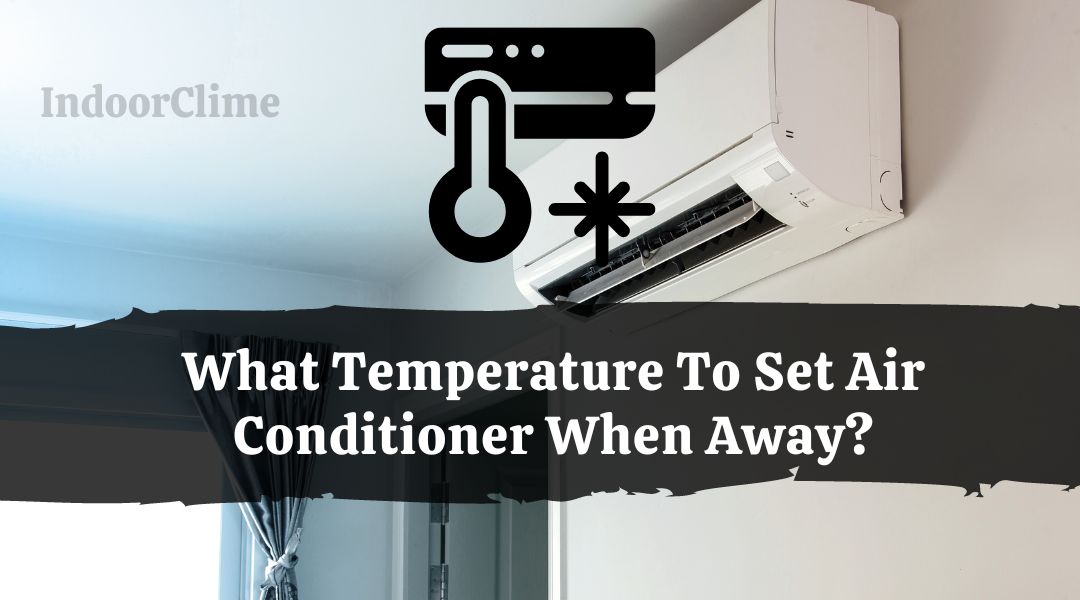Humid summer days can be uncomfortable. Evaporative coolers and whole-house fans can make a living in hot weather bearable, but they can never give you that pleasant feeling that air conditioner units can. Also, you don’t want to waste money unnecessarily cooling your house when you’re away on holiday or vacation.
You can use air conditioner temperature settings to reduce the unit’s energy consumption while you’re away.
The Department of Energy recommends setting your thermostat at 78° when away. It ensures that your AC does not run more than necessary, and you save money.
The Best AC Temperature Settings When You’re Away
When you leave your home for a trip and plan to be away for an extended period, knowing how to set the temperature to keep your home cool and comfortable while saving energy can be hard.
Here are some temperature settings that work well when you’re away from home:
- When You Go to work, set your thermostat to 74 degrees Fahrenheit if you’re at work. You’ll be out of your home for eight hours, giving your AC plenty of time to cool down the apartment. In addition, it will allow your AC unit not to work as hard while you’re gone and save you money on running costs. But it won’t be so high that you’ll return to an uncomfortably humid house.
- When You Go on Vacation, if you’re heading out of town for extended days or weeks, set your thermostat at 82 degrees Fahrenheit while you’re away. However, if temperatures are scorching while you’re gone, set the temperature at 78 degrees F instead. While these temperatures might seem pretty high, they protect your air conditioner from damage from running continuously in hot weather.
What is a Programmable Thermostat?
A Programmable Thermostat is a device to set your home’s air conditioning or heating for different times or other days of the week.
Because it can be programmed, you don’t have to worry about adjusting the temperature manually, and you can enjoy the comfort of a perfectly-temperature home.
Managing AC While on Vacation

If you turn off your AC when you leave for vacation and don’t leave any windows open, your home could get up to about 95 degrees. This heat can cause damage to your furniture and other belongings.
If you want to save money while managing your AC while on vacation, try turning the temperature a few degrees before leaving. The house won’t get too hot or cold while you’re gone, and you won’t waste electricity.
Length of Vacation
If you’re arranging to be away from home for a couple of days, it’s wise to consider the state of your air conditioner while you’re gone.
- A couple of days/Weekends. Keeping the AC running while you’re away is probably OK if it’s just a weekend getaway or a few days. You won’t use much more energy than expected, and the cold temperature will keep your home in good condition.
If your thermostat has a “vacation mode,” use that instead of manually raising it by 10 degrees; this will consider local weather conditions and automatically adjust as needed.
- Extended Period. Keeping your AC running can help prevent humidity from building up and causing mold if you’re away for an extended period. It can also protect any delicate furniture from warping or cracking due to sudden temperature changes. Ensure you set the thermostat higher than average so the AC doesn’t work too hard while no one is home.
- It takes a week or two. If you are gone for more than a week or two, the best option will likely be shutting down your AC system entirely and opening up all the windows in the house so that no hot air gets trapped inside.
Other Factors to Consider
Other factors can affect the degree of temperature control you should aim for and what kind of alternative energy solutions you should use, which we’ll get into below.
Weather
First, take a look at the weather. If it’s going to be chill outside, you may not have to worry about the heat in your home. In that case, you can turn off your AC for your trip.
However, if you’re traveling during warmer months, it’s best to turn on your air conditioning before leaving town and set the temperature to 78 degrees or higher. You can also turn on ceiling fans in each room before leaving. It will help circulate air throughout your home and make it feel more relaxed than it is.
Efficiency
Another factor to consider is efficiency. If you have an outdated system, there may be leaks in the ductwork or issues with insulation that could allow air to escape and lower your home’s overall temperature. In some cases, it’s better to upgrade your HVAC system before leaving on vacation.
If you do decide that an upgrade is right for you, talk with a trusted HVAC professional that can help lower your energy bill and keep your home completely comfortable while helping the environment at the same time.
If your system is old, it may be less efficient than newer models, so it will run much longer to cool down your house. Turning off your AC and opening the windows when you return home might be better.
Protecting Other Parts of Your Home
You might forget about this when worrying about the air conditioning, but you need to think about all parts of your home, not just your AC.
- Ensure there is nothing that will cause damage to walls and floors, such as leaking pipes or poor ventilation.
- Check all seals and weather stripping on windows, doors, and skylights to ensure they’re still in good condition.
- Remember not to leave a thing plugged in or on when you leave for vacation because doing so could strain your electrical system, leading to an outage or other problems while you are gone.
- Be sure to draw back any chargers or other electronics because they could use energy even when unused.
- Take the time to close all windows and secure doors and gates. You should also turn off the water in your home and shut off the power at the circuit breaker.
Other Steps to Prep Your Home for Vacation
- You should also make sure that your residence is locked from the outside.
- Ensure that valuables or documents are hidden or locked in a safe place.
- If you have pets, get someone to check on them or take them with you.
- Shut off the water supply to your washing machine and dishwasher. It will keep the AC unit from leaking while they’re not in use.
- If you don’t have pets but have plants, ask a friend or neighbor to water them so they don’t become a fire hazard when you’re gone.
- You can build in timers to automatically turn lights on and off while you’re gone, so it looks like someone is home. You can also install home security cameras.

People Also Ask
Should I leave my AC on when I am not home?
Yes. Turning on the air conditioner is probably worth it when you’re leaving your house for a short period. It is because it’s likely that the temperature outside will be hotter than the temperature inside.
No. When you plan to be away from your home for a more extended period. Then you should turn off your AC. You don’t want to waste money cooling down a space.
It is recommended that homeowners leave their ACs off when they are out of the house for more than four hours, as this will be sufficient to lower the temperature in their home by several degrees.
How low should you set the thermostat when away?
Warmer Seasons (Winter). You should never set your thermostat higher than 85 degrees Fahrenheit. Your AC unit will manage overtime to keep the temperature from going above this point, and it’s better to save energy by not running the AC.
Cooler Seasons (Summer). You should never set your thermostat lower than 50 degrees Fahrenheit. Again, this is because your heating unit will work overtime to keep the temperature from falling below this point, and again—it’s better to save energy by not running the heating unit at all.





